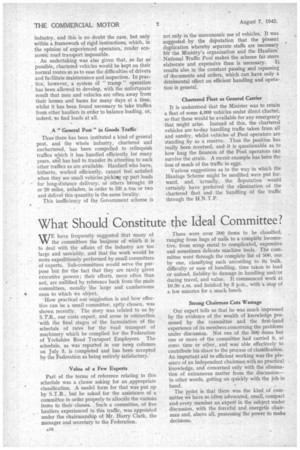What Should Constitute the Ideal Committee?
Page 18

If you've noticed an error in this article please click here to report it so we can fix it.
WE have frequently suggested that many of the committees the business of which it is to deal With the affairs of the industry are too large and unwieldy, and that the work would be more expeditiously performed by small committees of experts. Sub-committees would serve the purpose but for the fact that they are rarely given eiecutive powers ; their efforts, more often than not, are nullified by reference back from the main committees, usually the large and cumbersome • ones to which we object.
'How practical our ,suggestion is and how effective can be a small committee, aptly chosen, was shown recently. The story was related to us by S.T.R., our costs expert, and arose in connection with the final stages of the formulation of the schedule of rates for the toad transport of machinery which he compiled for the Federation of Yorkshire Road Transport Employers. The schedule, as was reported in our new columns on July 3, is completed and has been accepted by the Federation as being entirely Satisfactory.
Value of a Few Experts Part of the terms of reference relating to this schedule was a clause asking for an appropriate classification. A model form for that was put up by S.T.R., but he asked for the assistance of a committee in order properly to allocite the various items to their classes. ,..Such a committee, of five hauliers experienced in this traffic, was appointed under tha chairmanship of Mr. Harry Clark, the manager and secretary to the Federation.
AU3 • There were over 500 items to be classified, ranging from bags of nails to a complete locomotive, from scrap metal to complicated, expensive and sometimes delicate machine tools. The committee went through the complete list of 500, one by one, classifying each according to its bulk, difficulty or ease of handling, time taken to load or unload, liability to damage in handling and/or during travel, and value. It commenced work at 10.30 a.m. and finished by 3 p.m., with a stop of a few minutes for a snack lunch.
Strong Chairman Cuts Wastage Our expert tells us that he was much impressed by the evidence of the wealth of knowledge possessed by the committee and the first-hand experience of its members concerning the problems under discussion. Not one of the 509 items but one or more ofthe committee had carried it, at sorie time or other,_ and was able effectively to contribute his share to the process of classification. An important aid to efficient working was the plcsence of an independent chairman with no practical knowledge, and concerned only with the elimination of extraneous matter from the discussion— in other words, getting on quickly with the job in hand.
The point is that there was the kind of committee we have so Often advocated, small, compact and every member an expert in the subject under discussion, with the forceful and energetic chairman and, above all, possessing the power to make decisions.




















































